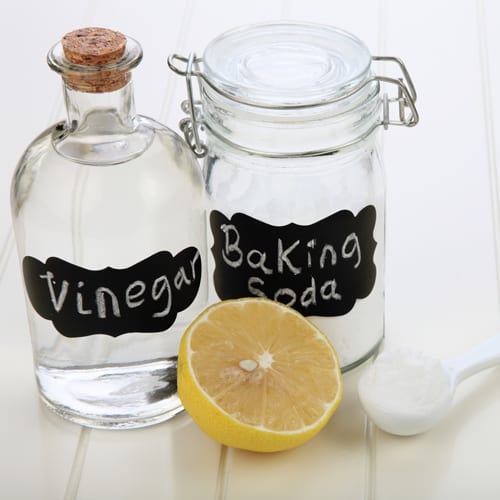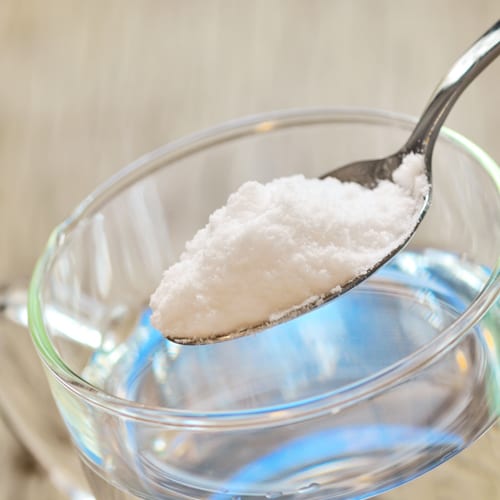Can I Use Bicarbonate Of Soda Rather Than Baking Powder
Can I Use Bicarbonate Of Soda Rather Than Baking Powder
What Is the Difference Between Baking Soda and Baking Powder?
If you're baking something, there's a good chance you'll see baking soda or baking powder in your recipe's list of ingredients. Have you ever wondered how these substances work with heat to transform your dough or batter into risen baked goods? Below, we explain what the difference between baking soda and baking powder is, how each ingredient works, and whether or not you can substitute one for the other.
Baking Soda vs. Baking Powder: What Is the Difference?
The difference between baking powder and baking soda is how many ingredients each contains. Baking soda is made of only one ingredient called sodium bicarbonate. Baking powder, on the other hand, is comprised of more than one ingredient. Baking powder contains sodium bicarbonate, but it has an additional acidic ingredient. Often, this acid is cream of tartar, also known as potassium bitartrate.
How Do Baking Soda and Baking Powder Work?
As chemical leavening agents, both of these substances help your baked goods to rise without yeast. Their leavening processes are not quite the same, however. Keep reading to see how baking soda and baking powder work, and why one may be more suitable for your recipe than the other.
How Baking Soda Works

When mixed with an acidic ingredient like lemon juice, buttermilk, yogurt, or even honey, baking soda undergoes a chemical reaction. This reaction occurs only when moisture is present and produces carbon dioxide gas, which looks like little air bubbles in your batter.
It is best to bake your batter or dough as soon as possible once you have added baking soda to it. Otherwise, your baked goods may not get enough rise because too much carbon dioxide could escape before baking.
How Baking Powder Works
Baking powder already contains an acidic ingredient, so it activates once it is mixed with liquid. Similarly to baking soda, the activation process of baking powder produces carbon dioxide gas that helps your baked goods rise.
Some baking powder is double-acting, which means that it is activated a second time with the addition of heat. Because of this second activation, you don't need to rush to get your batter or dough in the oven when you're using double-acting baking powder.
Can You Substitute Baking Powder for Baking Soda?
Yes, you can substitute baking powder for baking soda. However, baking powder is comprised of about 1/3 baking soda and 2/3 an acidic ingredient, so using the same amount of baking powder that your recipe calls for will not be as effective.
When you're in a pinch, remember this rule for conversion from baking soda to baking powder: for every 1 teaspoon of baking soda, substitute 3 teaspoons of baking powder.
Can You Substitute Baking Soda for Baking Powder?
Yes, you can substitute baking soda for baking powder. When doing so, though, you must ensure that you have enough of an acidic ingredient to activate the baking soda adequately. Because baking soda is roughly 3 times more powerful than baking powder, you'll need much less than the recipe calls for.
To substitute baking powder for baking soda, use 1 teaspoon of baking soda for every tablespoon of baking powder, and add 2 teaspoons of vinegar, lemon juice, cream of tartar, or another acidic ingredient to your batter or dough. Your substitute for baking powder will not be double-acting, so you should get your batter or dough in the oven as soon as possible after you combine it with wet ingredients.
How to Tell If Your Baking Soda or Baking Powder Is Still Good

Most packages of baking soda or baking powder have an expiration date of 18 months, but environmental factors can cause these ingredients to lose their potency faster. If you've had your baking soda or powder for over 6 months, you can check that it is still functional by mixing it with water.
To test baking soda, mix 1/4 teaspoon of baking soda with 2 teaspoons of vinegar. It should bubble immediately if your baking soda is useable.
To test baking powder, mix 1 teaspoon of baking powder with 1/2 cup of hot water. If it bubbles, your baking powder is still effective.
How to Store Baking Soda and Baking Powder
These ingredients can lose their potency faster if they are stored in warm or humid environments. Always make sure that your baking soda and baking powder packaging is tightly sealed, and that their storage place is not too warm. For example, your baking soda or powder should not be stored in a cabinet adjacent to your oven. It's best to keep these ingredients away from heat sources.
Many people say that baking is a science, and how baking soda and baking powder work as chemical leavening agents is an excellent example of science at work in your kitchen. Recipes use these ingredients to give your baked goods the perfect texture brought on by chemical reactions and carbon dioxide gas. As a result, precision is key when working with baking soda and baking powder. Next time you use one of these ingredients, remember our storage tips and directions for how to make sure that your baking soda or baking powder is still working.
Source: https://www.webstaurantstore.com/blog/2392/baking-soda-vs-baking-powder.html
Posted by: chaffeyabothe.blogspot.com
0 Response to "Can I Use Bicarbonate Of Soda Rather Than Baking Powder"
Post a Comment